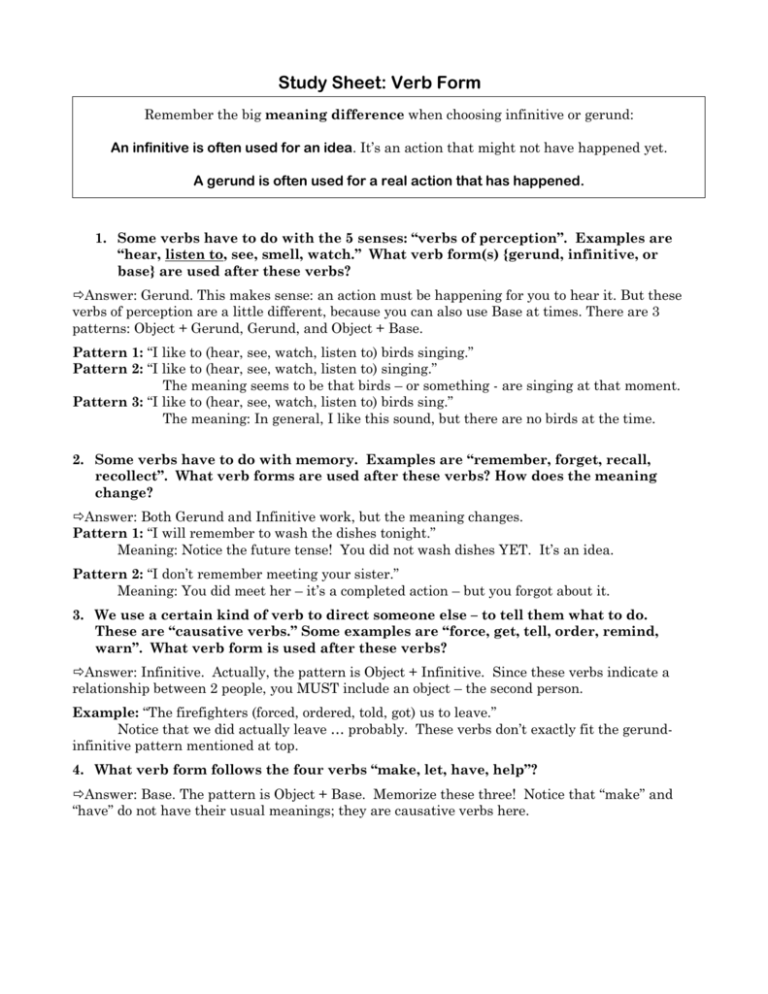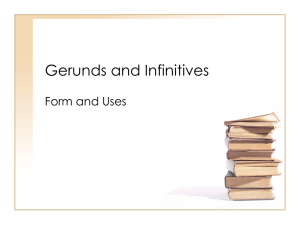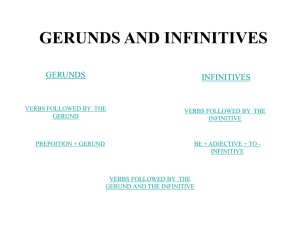Study Sheet: Verb Form
advertisement

Study Sheet: Verb Form
Remember the big meaning difference when choosing infinitive or gerund:
An infinitive is often used for an idea. It’s an action that might not have happened yet.
A gerund is often used for a real action that has happened.
1. Some verbs have to do with the 5 senses: “verbs of perception”. Examples are
“hear, listen to, see, smell, watch.” What verb form(s) {gerund, infinitive, or
base} are used after these verbs?
Answer: Gerund. This makes sense: an action must be happening for you to hear it. But these
verbs of perception are a little different, because you can also use Base at times. There are 3
patterns: Object + Gerund, Gerund, and Object + Base.
Pattern 1: “I like to (hear, see, watch, listen to) birds singing.”
Pattern 2: “I like to (hear, see, watch, listen to) singing.”
The meaning seems to be that birds – or something - are singing at that moment.
Pattern 3: “I like to (hear, see, watch, listen to) birds sing.”
The meaning: In general, I like this sound, but there are no birds at the time.
2. Some verbs have to do with memory. Examples are “remember, forget, recall,
recollect”. What verb forms are used after these verbs? How does the meaning
change?
Answer: Both Gerund and Infinitive work, but the meaning changes.
Pattern 1: “I will remember to wash the dishes tonight.”
Meaning: Notice the future tense! You did not wash dishes YET. It’s an idea.
Pattern 2: “I don’t remember meeting your sister.”
Meaning: You did meet her – it’s a completed action – but you forgot about it.
3. We use a certain kind of verb to direct someone else – to tell them what to do.
These are “causative verbs.” Some examples are “force, get, tell, order, remind,
warn”. What verb form is used after these verbs?
Answer: Infinitive. Actually, the pattern is Object + Infinitive. Since these verbs indicate a
relationship between 2 people, you MUST include an object – the second person.
Example: “The firefighters (forced, ordered, told, got) us to leave.”
Notice that we did actually leave … probably. These verbs don’t exactly fit the gerundinfinitive pattern mentioned at top.
4. What verb form follows the four verbs “make, let, have, help”?
Answer: Base. The pattern is Object + Base. Memorize these three! Notice that “make” and
“have” do not have their usual meanings; they are causative verbs here.
5. Another group of verbs that’s similar to causatives are “allow, advise, encourage,
permit.” How are these different from causatives? What verb form is used after
these verbs?
Answer: With no Object, use Gerund. With an Object, use Infinitive. There is very little
meaning difference.
Pattern 1: “The commander (allowed, advised, permitted) napping during training.”
Pattern 2: “The commander (allowed, advised, permitted) the new solders to nap during
training.”
OR
Pattern 1: “PCC doesn’t (allow, advise, permit) smoking on campus.”
Pattern 2: “PCC doesn’t (allow, advise, permit) students to smoke on campus.”
Like and Love, Dislike and Hate
Please notice this irregular pattern:
love to play
hate to play
like to play
dislike to play
love playing
hate playing
like playing
dislike playing
Gerund/Infinitive/Preposition: Finish the sentences with any good verb.
1. I thanked him –
2. I’m worried –
3. The students are always complaining –
4. Please apologize 5. We all discussed 6. The institute requires us 7. The regulations permit 8. I was listening to 9. Can anyone learn 10. My dentist wants to delay
11. She was expected 12. Bill resented his roommate 13. Did the criminal admit 14. Please allow us 15. The whole family anticipated 16. No one recollected 17. Did you risk 18. Did they recall 19. My friend challenged me 20. The teacher postponed . 21. Do you mind
22. Why did he pretend -
23. Did your roommate offer –
24. He doesn't deny 25. Somehow, the dog managed 26. Everyone avoided 27. The boy dared Al 28. Our boss threatened 29. The contestant practiced 30. My friend consented 31. I miss –
32. I don’t think I can stand –
33. My boss prefers –
34. The kids neglected –
35. Will anyone volunteer36. I just spent a day 37. Chinese people appreciate –
38. I absolutely dislike –
39. Do you practice –
40. This guy just keeps –
41. I don’t usually mind –
42. She seems 43. They are planning 44. I can't promise -
Phrases. Finish the given phrase.
It’s no use –
I’m so busy –
Don’t waste time –
We has a lot of fun –
People can’t help –
It's not worth My cousin had a good time The car has trouble I think we need to spend a few hours I spent three hours –
Sports. What sport and hobby activities use the pattern “go ____ing”? Think of
hobbies that Portlanders have. Write ten here.
Portlanders like to …
1. go mountain biking
6.
2.
7.
3.
8.
4.
9.
5.
10.
Preposition + gerund: What preposition completes these phrases?
be worried ____________ doing it
be responsible ____________ making it
carry ____________ talking
get / be used ____________ repeating it
be tired ____________ playing
get / be accustomed ____________ eating it
complain ____________ working on it
be interested ____________ learning it
approve ____________ creating it
give ____________ smoking
talk ____________ buying it
think _______________ going
Try: Remember that, in general, an infinitive is used for an idea - an action that hasn't
happened yet. A gerund is generally used for an actual action - something that HAS happened.
Based on that, how do you explain these sentences?
"Please try to turn the machine on."
"Just try to dance."
"You just need to try to talk to them."
"Try to remember where you were when you
lost your keys."
"Can you see? Why not try turning on the lights?"
"Try eating more fruit at lunch."
"This group is trying taking vitamins daily."
"Try dancing with my sister. She's really good."
A: The action may not work - we don't know if it can succeed.
B: The action will work. You may or may not like it, but it will succeed.
Fill in the Blank
1. Keep (talk) _____________________. I’m listening to you.
2. The children promised (play) _____________________ more quietly next time. They promised
(make, not) __________________________ so much noise.
3. Linda offered (look after) _____________________ my cat.
4. You had better not put off (pay) _____________________ your bills.
5. That dog loves (chase) _____________________ sticks.
6. You mentioned (go) _____________________ to the store today – are you still planning (go)
_____________________?
7. Please, stop (whistle) _____________________. I’m trying (concentrate) _____________________.
8. The professor spends a lot of time (research) _____________________ her new book.
9. I hope you’ll decide (quit) _____________________ smoking soon.
10. Did you remember (turn off) _____________________ the iron?
11. Toshi was allowed (renew) _____________________ his student visa.
12. Pat told us (not wait) _____________________ for her.
13. Don’t tell me his secrets. I prefer (not know) _______________________________.
14. Will you remind me (call) _____________________ my boss tomorrow?
15. Wow. This smell reminds me of (be) ______________________ in my grandma’s house.
16. She encouraged me (throw away) _____________________ these old shoes and (buy)
_____________________ new ones, but I love these shoes!
17. Don’t forget (tell) _____________________ Jane (call) _____________________ me tomorrow about
(go) _____________________ swimming tomorrow.
18. I’ll never forget (carry) _____________________ my daughter home from the hospital the first
time.
19. That movie was terrible – the audience started (leave) _____________________ before it was
over.
20. We are spending too much money on restaurants. Let’s try (cook) _______________________ at
home more often.
21. I’ve never tried (learn) ______________________ Russia. Is it easy?
22. After the interruption, the professor continued (lecture) _____________________.
23. I regret (inform) _____________________ you that your loan application has been rejected.
24. It’s easy to regret (cheat) ______________________ after you get caught.
25. Don’t waste time (argue) _____________________ .
26. The directions are really clear. We're not permitted (alter) _____________________ it ourselves.
27. Even though the political situation keeps (get) ______________ worse, the news just keeps
(report) ___________________ about celebrities and scandals.
28. Instead of (complain), ______________________ the team should practice more.
29. Besides (offer) _________________ good prices, they guarantee their products.
30. The student nurses really look forward to (meet) ________________ the new patients.








